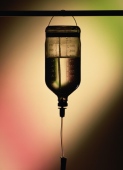
WEDNESDAY, April 17 (HealthDay News) — Replenishing certain nutrients in critically ill patients may not be the best therapy for them, new research suggests.
Giving supplements of the amino acid glutamine in intravenous fluids was linked to a nearly 30 percent increase in the risk of death, according to the study. The researchers also found that replacing antioxidants didn’t appear to lower the risk of death or organ failure.
“When you get sick, your body has [internal] mechanisms to help you get better. Levels of glutamine and antioxidants get depleted, and we thought giving them back would be beneficial. So, we picked the sickest patients — critically ill patients with multi-organ failure — and gave them back high doses,” explained study author Dr. Daren Heyland, a professor of medicine at Queens University in Kingston, Ontario.
“We were totally surprised to find that glutamine was harmful. There was no prior indication in the literature that it could be harmful. Antioxidants were neutral. They weren’t positive or negative. It’s likely that we gave too little antioxidants and [didn’t give them quickly enough],” Heyland said.
As to why glutamine was linked to an increased risk of death, Heyland said the researchers aren’t sure how that happened. “Perhaps the changes that occur because of sickness are adaptive rather than maladaptive,” he said.
Results of the study appear in the April 18 issue of the New England Journal of Medicine.
The author of an accompanying editorial, Dr. Greet Van den Berghe, head of intensive care medicine at University Hospitals Leuven, in Belgium, agreed that low glutamine levels may be an adaptive response.
“If patients show low glutamine levels acutely in response to severe illness, it certainly looks like one should not correct this with the dose used in this study,” Van den Berghe said.
But, she added that more research should be done because the average glutamine levels weren’t especially low in this study, and she suggested that the dose of replacement glutamine given might have been too high, or it might have been given too early in the course of the illness.
Overall, she said, this study shows that glutamine may have the potential to cause harm. “I think this study, given its power and quality and showing a substantial rise in the risk of death with the treatment, strongly advises against infusing glutamine in severely ill patients with multiple organ failure in the ICU. The outcome of this study forms a solid basis for changing clinical practice guidelines,” she said.
Heyland’s study included 1,223 critically ill patients treated in 40 intensive care units in Canada, the United States and Europe. All of the patients had multi-organ failure and were on mechanical ventilation to breathe.
The patients were randomly assigned to receive glutamine, antioxidants, both or a placebo treatment within 24 hours of admission to the intensive care unit.
The results showed a “trend” in the association between receiving glutamine and a higher death rate. Thirty-two percent of those who received glutamine died within 28 days, compared with 27 percent of those who weren’t given glutamine. The risk of dying if given glutamine was 28 percent higher than for patients who weren’t given glutamine.
In a stronger finding deemed statistically significant, in-hospital deaths and deaths within six months were also higher for those given glutamine, according to the study.
Heyland said it’s important to note that this study’s finding only apply to the critically ill patients with multi-organ failure. Glutamine is often used beneficially in patients who aren’t so sick, he said.
“Overall, there was no suggestion that glutamine supplementation was harmful until this report,” said Dr. Rafael Barrera, director of the surgical intensive care unit at Long Island Jewish Medical Center in New Hyde Park, N.Y. “It now appears that the low glutamine levels are an adaptive response to inflammation and probably a protective pathway to down-regulate the stressed system.”
Barrera said glutamine supplementation hasn’t been widely adopted in the United States and he expects that the results of the latest study will cause a further decrease in the use of glutamine in the care of critically ill patients.
More information
Learn more about how antioxidants affect general health at the U.S. National Center for Complementary and Alternative Medicine.

